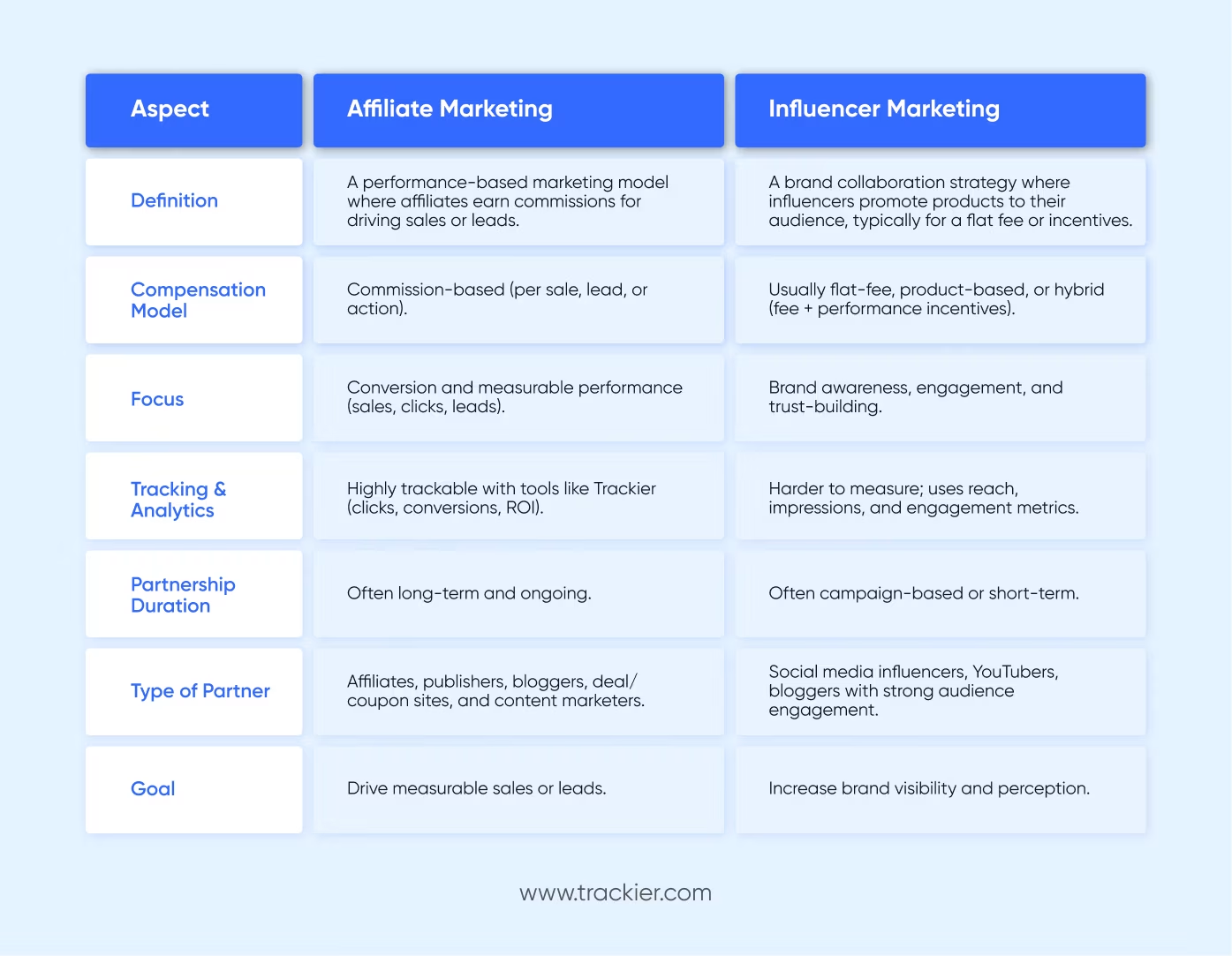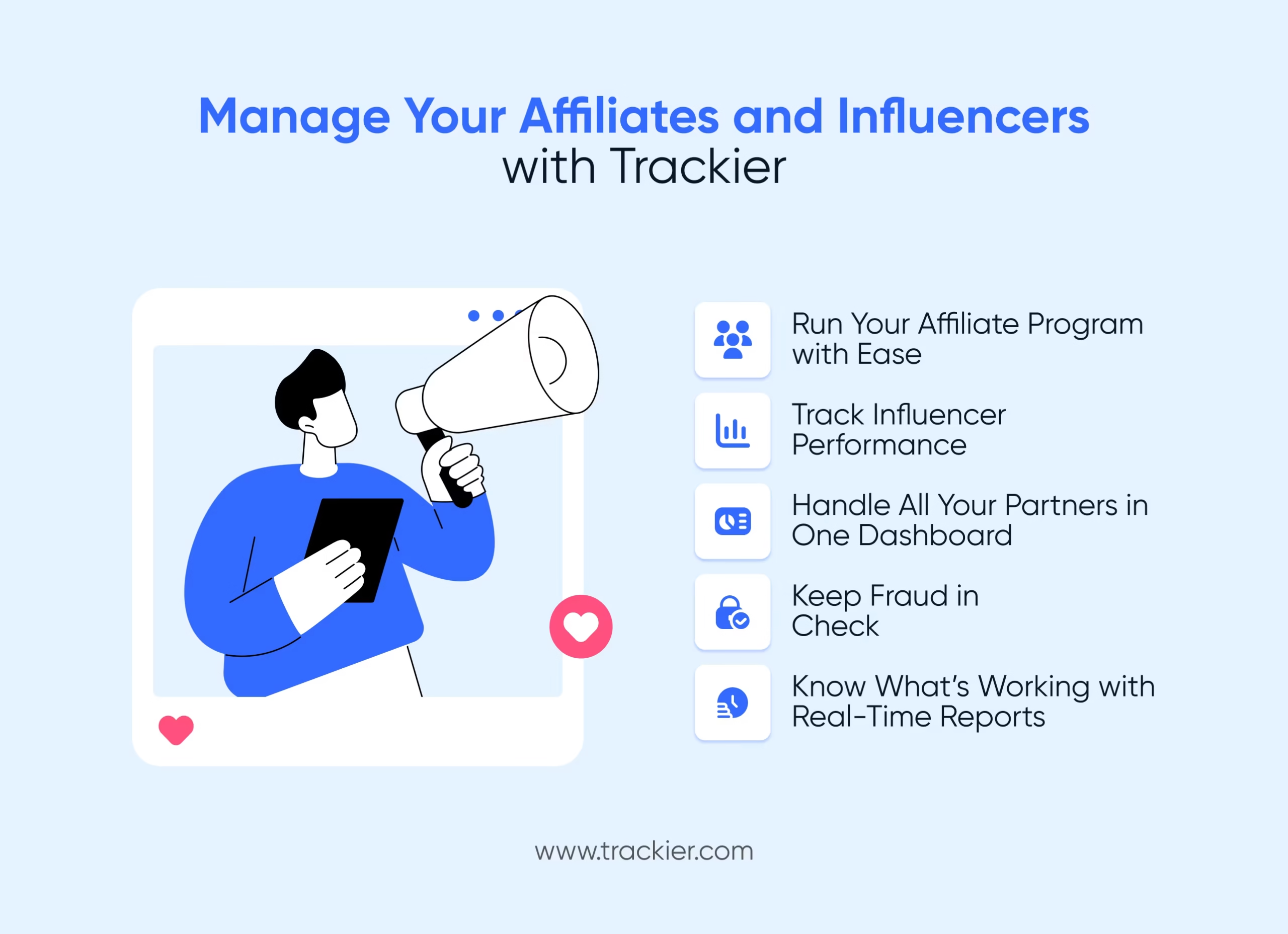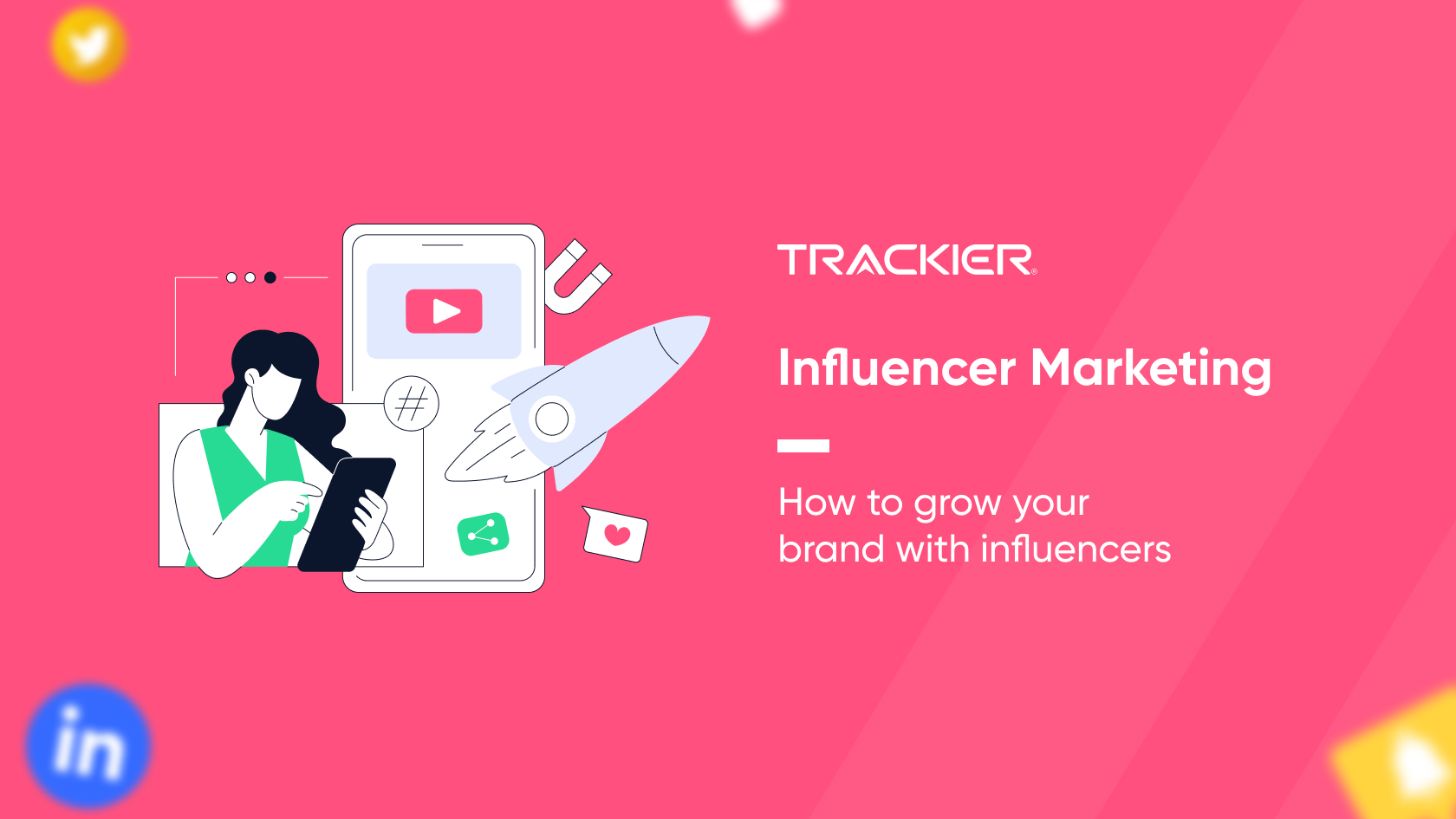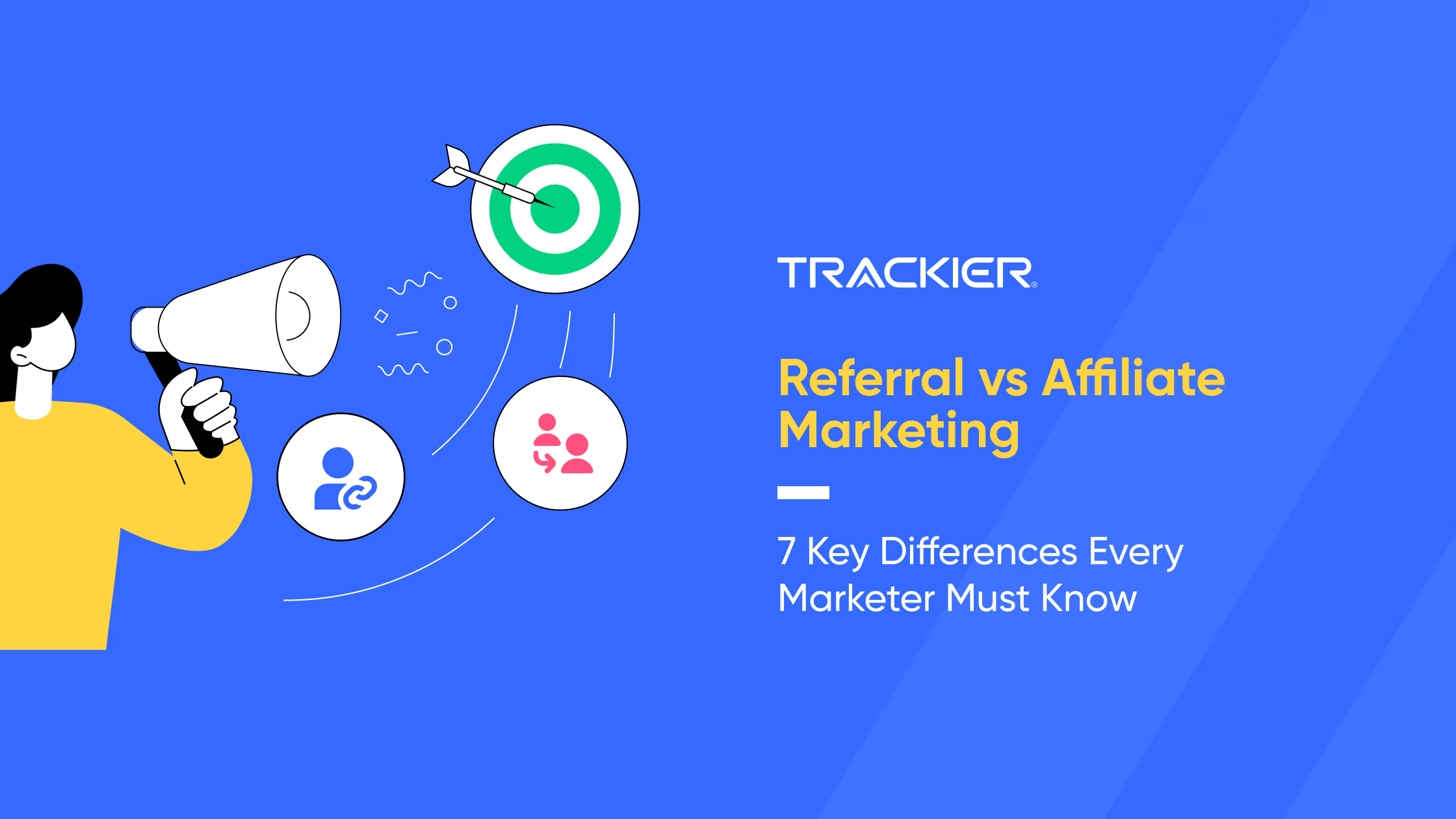Affiliate and influencer marketing have really taken off in recent years. If you look at the numbers, the affiliate marketing space is expected to be worth over $17 billion by 2025, and some estimates say it could even hit $37 billion by 2027. Influencer marketing is already big, too, sitting at $24 billion in 2024.
While both are definitely growing fast, they don’t really work the same way. Understanding the difference between affiliate marketing vs influencer marketing can make a huge difference for your brand.
That’s where tools like Trackier help you keep track of your campaigns, see your ROI, and stay on top of both affiliates and influencers, all from one platform – no more managing endless spreadsheets or trying to keep track of everything manually.
What is Affiliate Marketing?
Affiliate marketing is a strategy where you, as a business, partner with people (affiliates) who promote your products or services online. In return, you pay them a commission for every sale or lead they bring in.
The cool part? You are only paying for actual results. No wasted money on impressions or “brand awareness”. If someone clicks an affiliate’s link and buys something, that’s when you pay.
How does it typically work?
- A brand sets up an affiliate program.
- Affiliates join the program and get unique tracking links or promo codes.
- They share those links through their content (blogs, review sites, social media).
- A visitor clicks and makes a purchase.
- The system tracks the sale, and the affiliate gets paid.
Why is it a smart move?
- You are not guessing; every click and sale is trackable.
- You can scale easily by adding more affiliates.
- You control the cost – only pay for real conversions.
- It is ideal for everything from e-commerce to SaaS and even fintech.
What is Influencer Marketing?
Influencer marketing takes a different approach. Instead of focusing solely on driving sales, it is about building trust and visibility through people who already have an audience.
Influencers are usually active on platforms like Instagram, YouTube, TikTok, or X. They create content around specific topics or lifestyles, and when they mention your brand, their audience listens.
Instead of being paid per sale, influencers are usually paid a flat fee per post or campaign, though some brands also give them a bonus or commission if their post performs well.
How influencer campaigns work?
- You reach out to an influencer (or go through an agency).
- They agree to promote your product to their followers.
- They create content – a post, video, or story – featuring your brand.
- Their audience engages, clicks, and (hopefully) converts.
Why does it work?
- People trust influencers more than ads – it feels authentic.
- You get access to highly engaged, loyal followers.
- It’s a great way to boost brand awareness and credibility.
- Influencers generate content that you can often reuse.
Difference Between Affiliate Marketing vs Influencer Marketing
Here is the detailed difference between affiliate marketing and influencer marketing based on various factors, including compensation model, focus, type of partners, etc.

How Trackier Helps?

Managing affiliates and influencers separately can be a hassle. Different tools, lots of data, manual tracking – it gets messy fast. That’s where Trackier (a performance marketing software) helps.
It provides you with a central platform to manage both affiliates and influencer campaigns, with all of the tracking, reporting, and automation you need.
1. Run Your Affiliate Program with Ease
With Trackier, you can set up affiliate offers, issue tracking links, monitor conversions, and handle payouts – all in one platform.
- Generate custom tracking links with a few clicks.
- Set rules for commissions based on country, device, or event.
- Get real-time reports on what is working (and what is not).
2. Track Influencer Performance
A lot of brands assume influencer marketing can not be tracked. That is not true, at least not when you use Trackier. It offers:
- Give influencers unique links or coupon codes.
- See exactly how much traffic and how many sales each influencer drives.
- Combine engagement data with actual performance.
- Optimize future partnerships based on real results.
3. Handle All Your Partners in One Dashboard
Instead of juggling between spreadsheets, emails, and DMs, you can manage your entire partner network – affiliates and influencers – from a single interface.
- Group your partners by role, region, or campaign.
- Onboard them with automated workflows.
- Send updates, approve campaigns, and track everything in one platform.
- Provide a dedicated portal for your partners to log in and check stats.
4. Keep Fraud in Check
Whether you are dealing with shady traffic or fake engagement, fraud is a real issue. Trackier identifies the fraudulent traffic earlier. Also offers:
- Advanced fraud detection based on IP, device, and click patterns.
- Set rules to block or flag unusual activity.
- Ensuring your marketing budget is only spent on real, high-quality results.
5. Know What’s Working with Real-Time Reports
One of the biggest advantages of using Trackier is clarity. No more guessing which partner is performing best – the data speaks for itself. Also provides:
- Break down performance by channel, partner, or campaign.
- Analyze conversions, earnings, and ROI in real-time.
- Export reports or connect them to your existing BI tools.
Conclusion
In conclusion, affiliate marketing and influencer marketing aren’t competing strategies – they are complementary. One is perfect for measurable, performance-based growth. The other builds trust and gets your brand in front of the right audience.
When used together, they can power both the top and bottom of your marketing funnel. And with Trackier, you don’t have to manage them separately. It gives full control over your entire partner marketing ecosystem, from affiliate to influencer and everything in between.
1. Is it possible for an ad campaign to utilize both affiliate and influencer marketing?
Yes, many brands use both approaches. Influencers can be engaged as affiliates and share traceable promotional links or promo codes. By employing both strategies, brands can tap into followers to help drive conversions (affiliated marketing) and engage the influencer’s audience while building trust and awareness (influencer marketing) that generates increased ROI across the marketing funnel.
2. Which type of marketing is generally more cost-effective: influencer or affiliate marketing?
The affiliate marketing strategy is typically the more cost-effective option. For affiliate marketing, a brand pays for a sale or a lead when they see results, and, therefore, they are only paying for outcomes. For influencer marketing, a brand will typically need to pay upfront or gift items even if there are no sales or leads. In your campaigns, there can be good cost-effectiveness in both influencer and affiliate marketing, but the overall cost-effectiveness will ultimately depend on campaign objectives, influencer credibility, and the ability to track results.
3. What are the key differences when measuring success in affiliate vs influencer marketing?
Affiliate marketing is measured using KPIs that track conversions, click-through rate, and ROI. Influencer marketing is usually surveillance using metrics based on reach, engagement rate, sentiment, and follower growth. The metrics and benchmarks for each type of strategy vary depending on objectives.
4. Which marketing strategy is better for product launches: affiliate or influencer marketing?
Usually, influencer marketing will be more effective for posts or product launches. Influencers can help create buzz, educate, and tell a story that creates anticipation, building excitement for your product(s). Affiliate marketing strategies usually surge post-launch as they mostly assist with conversions.
5. Are influencers always affiliates?
Not necessarily. Influencers can just post a brand for a flat fee, with no affiliate links or tracking codes. Many influencers will also join affiliate programs and earn commissions. Together, they act as advocates for the brand while also acting as a performance partner.



